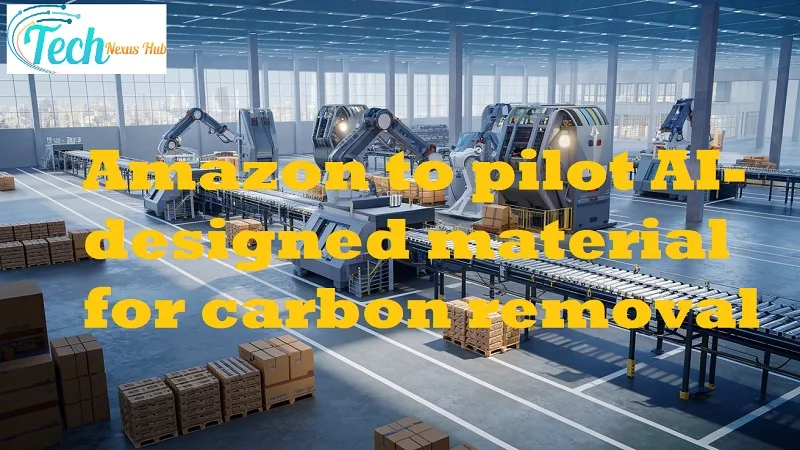One example of Amazon actively working to move towards greater sustainability is a new test project of a specialized carbon-removal material that would be used primarily for its data centers. These centres which serve as the backbone of artificial intelligence systems are increasingly becoming environmentally sensitive. The new material was derived from Orbital Materials which is a startup company that relies on artificial intelligence to design the material.
Amazon's AI-Engineered Solution to Combat Carbon Footprints
Jonathan Godwin, the CEO at Orbital Materials compared the material to an atomic sponge that filters CO2 selectively. “Each cavity in that sponge has a special opening to engage the CO2 while rejecting all other substances,” he said. This is a type of design based on the use of innovative artificial intelligence to minimize emissions at their source level.
Another key factor with regards to the material is cost because people would prefer the material that covers as many expenses as possible. Godwin said that its application can increase the cost of renting an hour of a GPU chip for AI training by only 10% — much lower than a carbon offset. Due to this, it can be argued that it could be a solution that can be adopted at a large scale and applied to the technological field.
As the AI technologies advance, data centers have become energy and water Guzzlers posing a hearger environmental impact. This is contrary to the likes of Amazon firm that has promised to emit zero carbon by the fiscal year 2040. It is always important to challenge emissions at the operational level in order to achieve such goals.
Introducing AI-engineered solutions into Amazon, the company is likely to operate in two directions – technological and environmental. This pilot should therefore have positive implications for other corporations that want to find new approaches to dezvoltarea tehnologică oponete de impactul negativ asupra mediului înconjurător.
AWS Partners with AI Startup to Advance Green Innovation
Today’s news that AWS, the leading cloud-computing provider in terms of revenue, is making a big move toward sustainability. AWS is to launch a world-first carbon capture material in one of its zones in 2025. This is within a framework of a three-year collaboration with Orbital Materials, an AI-focused startup dedicated to working on sustainability.
In the partnership, AWS will offer its sophisticated technologies to Orbital, which will allow it to work on further improvements in its research and development sector. Furthermore, Orbital intends to make availability of the new open-source AI of the company to AWS clients, making a greater range of new solutions possible.
Howard Gefen, general manager of AWS Energy & Utilities mentioned how this partnership is crucial to achieving the goal of witnessing more sustainable innovation. He pointed out that such partnerships are important in developing technologies that would respond to business needs for development and at the same time respond to some of the most sensitive environmental issues.
Although the bells and whistles of this deal have not been disclosed in terms of the capital aspect, both companies would clearly be in a win-win situation in this partnership. For AWS, the pilot can be seen a chance to test the viable strategies of carbon footprint reduction at a larger scale and at a lesser cost. As for Orbital, the developed idea means the opportunity to perfect and adjust the given sophisticated technology for the international market.
This partnership showcases AWS sustainable development strategy alongside deploying Artificial Intelligence to solve some emerging environmental issues. If successful, it may also encourage other cloud solution providers to follow suite and achieve environmentally friendly practices in future technological solutions.
Orbital Labs and AWS: Shaping the Future of Sustainable Data Centers
Currently, the company called Orbital Materials, based in both New Jersey, Princeton, and London, is leading the way on AI solutions for sustainability. The company placed a research lab about a year ago, which produces materials that are replicated by its AI for testing, which represents the next step toward practical implementation, according to the CEO Jonathan Godwin.
Together with AWS, Orbital should and will be able to enhance its existing developments even more. The collaboration aims at generating new materials through AI from which specific problems in the data centres such as water intake and chip cooling will be solved. This is in line with AWS’s over arching sustainability framework for their operation around the world.
Orbital was co-founded by Godwin, who has previously worked as a research scientist in materials science at Alphabet’s DeepMind unit. Since its founding, the company has received substantial support, which includes investment from Radical Ventures as well as Nvidia ‘s venture division, proving its perspective in AI and materials science.
The team of the startup is 20 people; many of them perspective leaders, who use technological background and their knowledge about the IT industry and AI problem-solving to meet modern environmental issues. As a result, the continued collaboration with AWS is an opportunity to test the materials themselves on a commercial level while fine-tuning the technology.
AWS partnership and increasing portfolio of Orbital together with the perspective to develop AI-based solutions for sustainable development. With the pressure on making IT practices more environmentally friendly, such solutions might become the key to minimizing the footprint of data centers around the world.


